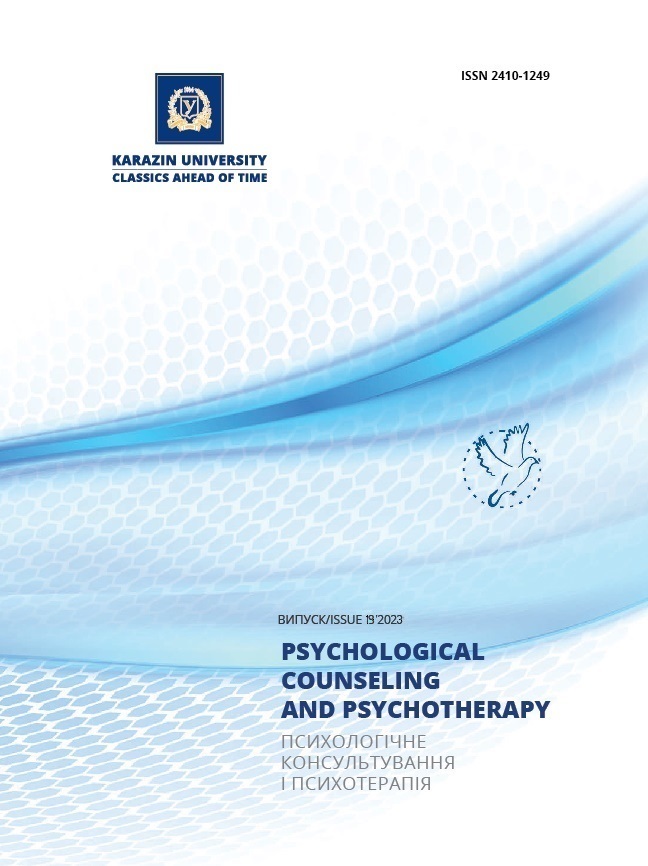Validation of the scale of essentiality/infernality (E/I) questionnaire for the diagnosis of essential self-regulation (QDES)
Abstract
The article is devoted to the study of the validity of one of the scales of the QDES psychodiagnostic method "Questionnaire for the diagnosis of essential self-regulation" - Essentiality/Infernality (E/I). The construct Essentiality/Infernality is a constituent element of the concept of essential self-regulation, which ensures the realization of a person's tendency to self-actualization. Essentiality is the result of a person's conscious or unconscious choice towards personal growth and development, the realization of a true tendency towards self-actualization. Such a choice can be called essential. The antagonist of the true tendency to self-actualization is the infernal choice - towards the distortion of the tendency to self-actualization. E/I is a special scale that is aimed at determining the ability of the examinee to choose communicative messages that have signs of essentiality - essential self-actualization, or, on the contrary, to choose messages that have signs of infernality - distorted self-actualization. That is, the ability to either make an essential choice in life or an infernal one. The work presents the tasks of the scale, the signs of essentiality and infernality are provided. The tasks of the E/I scale differ from the tasks of other scales of the QDES method. In general, the QDES technique is built on the basis of statements with which the examinees either agree or disagree. The tasks of the E/I scale are built on the basis of the statements of prominent persons - people who realized themselves in the profession (writers, philosophers, psychologists, etc.) and people with distorted self-actualization - serial killers. Each task is evaluated for the presence of essential and infernal features. The results of a correlational study of the E/I scale and other scales of the QDES methodology and 15 other psychodiagnostic methodologies are given. Descriptors of the E/I scale among other scales of the QDES methodology are defined. The result of the work is confirmation of the criterion validity of the E/I scale.
Downloads
References
Dmytrienko, К. (2012). Self-regulation of the behavior of convicts prone to systematic violations of the detention regime in places of deprivation of liberty [Text]: autoref. theses of the candidate of psychological sciences: 19.00.06 / Kateryna Valeriivna Dmytrienko; Khark. national University of Internal Affairs affairs]. - Kharkiv. – p.18. (in Ukrainian).
Kocharian, I. (2017). The system of joy: essential self-regulation of the psyche and its psychological correction: monograph / I. Kocharyan. - 2nd ed., Kharkiv: V.N. Karazin KhNU]. – p. 288.
Cole, P. M., Michel, M. K., Teti, L. O. (1994). The development of emotion regulation and dysregulation: a clinical perspective. Monogr. Soc. Res. Child. Dev. 59(2 3). 73 100. https://doi.org/10.2307/1166139. PMID 7984169.
Thompson, R. (1994). Emotion regulation: a theme in search of definition. Monogr Soc Res Child Dev. 59(2 3). 25 52. https://doi.org/10.2307/1166137. PMID 7984164.
Gross, J. (2002). Emotion regulation: affective, cognitive, and social consequences. Psychophysiology. 39(3), p. 281–91. https://doi.org/10.1017/S0048577201393198. PMID 12212647.
Niven K., Totterdell P., Holman D. (2009). A classification of controlled interpersonal affect regulation strategies. Emotion. 9(4), 498–509. https://doi.org/10.1037/a0015962. PMID 19653772.
Garnefski, N., Kraaij V. (2007). The Cognitive Emotion Regulation Questionnaire: Psychometric features and prospective relationships with depression and anxiety in adults. European J. of Psychological Assessment. (23), 141–149.
Baumeister, R., Vohs, K., Tice, D. (2007). The strength model of self-control. Current Directions in Psychological Science, 16(6), 351-355.
Bo O’Connor, B., Fowler, Z. (2023). How Imagination and Memory Shape the Moral Mind. Personality and Social Psychology Review, 27(2), 226–249. https://doi.org/10.1177/10888683221114215.
Bergsma, A., Buijt, I., Veenhoven, R. (2020). Will Happiness-Trainings Make Us Happier? A Research Synthesis Using an Online Findings-Archive. Frontiers in Psychology, 11, art. no. 1953. https://doi.org/10.3389/fpsyg.2020.01953.
Kocharian, O. (2016). Stages of development of client-centered psychotherapy. The Journal of V. N. Karazin Kharkiv National University. A Series of «Psychology», (59), 75-85. https://periodicals.karazin.ua/psychology/article/view/6041.
Kocharian, O., Barinova, N. (2016). Process theory in client-centered psychotherapy. Psychological counseling and psychotherapy], 1(5), 41-51. https://doi.org/10.26565/2410-1249-2016-5-04. (in Ukrainian).
Hobfoll, S. (2002). Social and psychological resources and adaptation. Review of General Psychology, 6(4), 307-324. https://doi.org/10.1037/1089-2680.6.4.307.
Kaufman, S. (2023). Self-Actualizing People in the 21st Century: Integration with Contemporary Theory and Research on Personality and Well-Being. Journal of Humanistic Psychology, 63(1), 51-83. https://doi.org/10.1177/0022167818809187.
Maunz, L., Glaser, J. (2023). Does Being Authentic Promote Self-actualization at Work? Examining the Links Between Work-Related Resources, Authenticity at Work, and Occupational Self-actualization. J. Bus. Psychol. (38), 347 367 https://doi.org/10.1007/s10869-022-09815-1.
Molina, M., Iribarne, K., Menéndez, M. Ángela, Álvarez Ituraín, A. (2023). La percepción de un futuro significativo y su relación con el autoconcepto y las experiencias positivas durante pandemia de covid-19 en estudiantes de nivel superior: The perception of a significant future and its relationship with self-concept and positive experiences during the covid-19 pandemic in higher level students. Psicogente, 26(49). https://doi.org/10.17081/psico.26.49.5765.
Kocharian O. (2015). The subverbal model of client-centered psychotherapy. Psychological counseling and psychotherapy, 2(1-2), 49-57. https://periodicals.karazin.ua/psychotherapy/article/view/4999.
Kocharian, I., Servinskiy, V. (2019). Questionnaire for the diagnosis of essential self-regulation and psychometric assessment of its tasks. Bulletin of H.S. Skovoroda KhnPU. Psychology. 60, 209-230. (in Ukrainian).
Kline, P. (1994). Reference manual for designing tests. – Kyiv: PAN Ltd.
Kushlev, K., Radosic, N., Diener, E. (2022). Subjective Well-Being and Prosociality Around the Globe: Happy People Give More of Their Time and Money to Others. Social Psychological and Personality Science, 13(4), 849–861. https://doi.org/10.1177/19485506211043379.
Citations
Features of the Emotional Component of Essential Self-Regulation Associated with Women's Marital Satisfaction
Kocharian Igor & Kuznetsova Daria (2024) Psychological Counseling and Psychotherapy
Crossref








